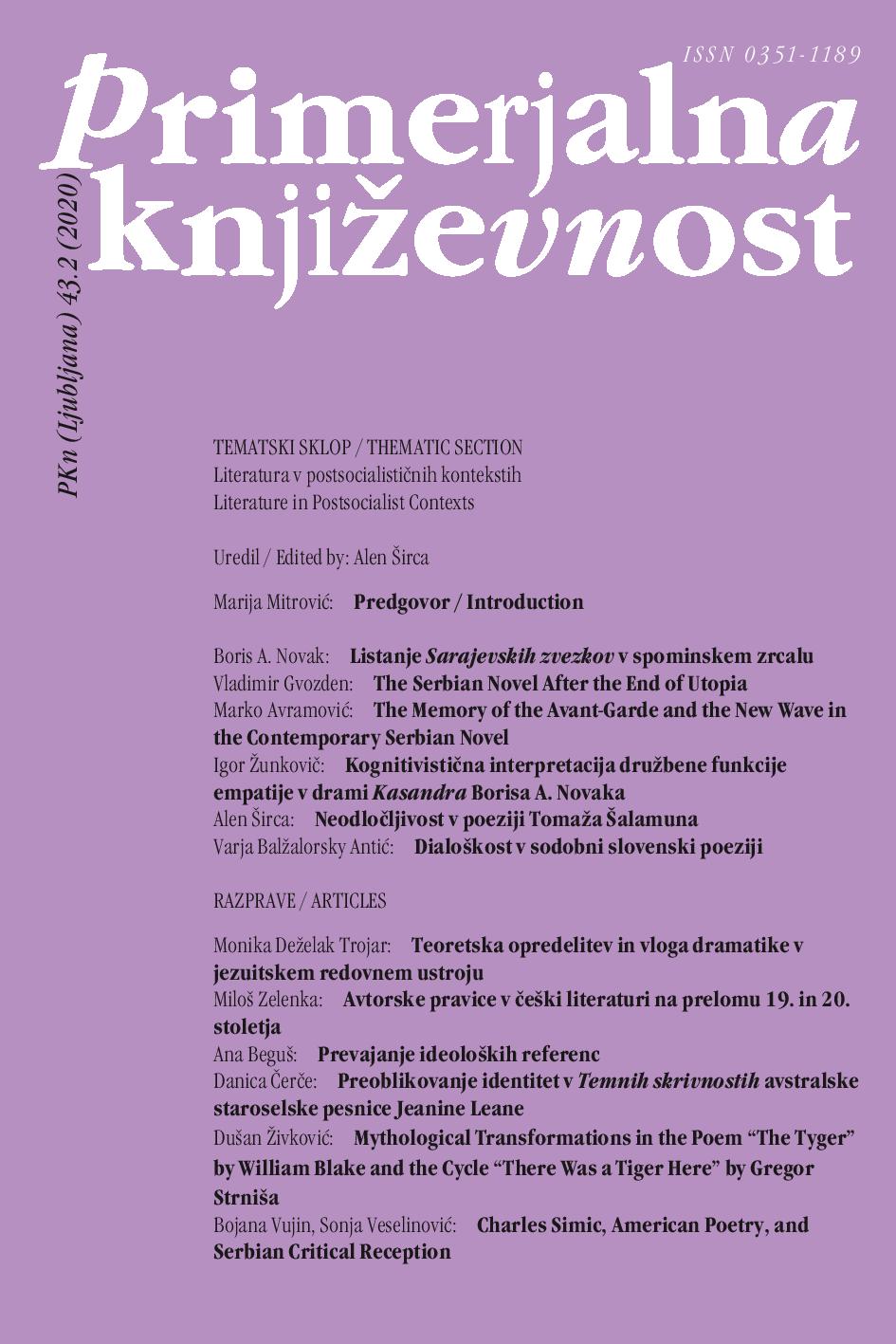The Serbian Novel After the End of Utopia: “Reconstructive” versus “Deconstructive” Writing?
DOI:
https://doi.org/10.3986/pkn.v43.i2.02Keywords:
literature and politics, Serbian literature, historical novel, nationalism, cultural identity, deconstruction, postmodernism, Pavić, Milorad, Petković, Radoslav, Petrović, Goran, Albahari, David, Tasić, Vladimir, Tišma, SlobodanAbstract
Numerous Serbian novels of the 1980s and 1990s turned to the treatment of an older, allegedly forgotten history which encompasses the premodern period from the Middle Ages to the Enlightenment. It seems that this shift was accompanied by a political idealism and national-emancipatory zeal after the breakup of socialist Yugoslavia and its cultural politics. This paper will critically examine three extremely successful examples of historical postmodernism in contemporary Serbian literature: Milorad Pavić’s Dictionary of the Khazars (1984), Radoslav Petković’s Destiny, Annotated (1993) and Goran Petrović’s Opsada crkve Svetog Spasa (The Siege of the Church of Holy Salvation, 1997). This “historical turn” of historical postmodernism could be interpreted both as a deceptive attempt to return to the roots and as distinct archaeology with which writing seeks to examine the contemporary unsafe ground of the political, cultural and economic transition from the socialist system to democracy and capitalism. Actually, it seems that this kind of “reconstructive” novelistic approach, which can be seen as a deliberate postmodern double-coding, could be understood as a search for Serbian cultural capital that can be easily—perhaps too easily—found in the distant past. On the other side, the paper analyses “deconstructive” novels, like David Albahari’s Bait (1996), Vladimir Tasić’s Kiša i hartija (Rain and Paper, 2004) and Slobodan Tišma’s Bernardijeva soba (Bernardi’s Room, 2011). The novels from this camp demonstrate that the complexity connected with the demise of meta-narratives is not easy to represent in a work of literature. Through the figure of a weak subject, the “deconstructive” novel is able to imprint itself into the unknown, to disrupt codes, to cross the border and the wall of the symbolic order of capitalism and socialism and their production of desire. At the end of the paper, the paradoxes inherent in both these types of writing are presented.
References
Barthes, Roland. <em>Le Degré zéro de l’écriture</em>. Paris: Gouthier, 1971.
Charle, Christoph. <em>Les Intellectuels en Europe au XIXe siècle: essai d’histoire comparée</em>. Paris: Seuil, 1996.
Derrida, Jacques. “Et Cetera.” Trans. Geoff Bennington. <em>Deconstructions: A User’s Guide</em>. Ed. Nicolas Royle. London: Palgrave Macmillan, 2000. 282–305.
Epstein, Mikhail. <em>After the Future: The Paradoxes of Postmodernism and the Contemporary Russian Culture</em>. Amherst: The University of Massachusetts Press, 1995.
Erjavec, Aleš. “Introduction.” <em>Postmodernism and Postsocialist Condition: Politicized Art Under Late Socialism</em>. Ed. Aleš Erjavec. Berkeley: University of California Press, 2003. 1–50.
Fleck, Christian. “Introduction.” <em>Intellectuals and Their Publics: Perspectives from the Social Sciences</em>. Eds. Christian Fleck, Andreas Hess and E. Stina Lyon. Farnham: Ashgate, 2006. 1–16.
Groys, Boris. “The Other Gaze: Russian Unofficial Art’s View of the Soviet World.” <em>Postmodernism and Postsocialist Condition: Politicized Art Under Late Socialism</em>. Ed. Aleš Erjavec. Berkeley: University of California Press, 2003. 55–89.
Gvozden, Vladimir. “Magical Realism and the Politics of Narrative: Historical Postmodernism in the Contemporary Serbian Novel.” <em>World Literature Studies</em> 2.8 (2016): 64–75.
Gvozden, Vladimir. “Novosadski roman i urbana nelagodnost: sedam napomena i jedna ‘opomena.’” <em>Letopis Matice srpske</em> 491.1–2 (2013): 101–117.
Gvozden, Vladimir. “Pisanje posle trijumfa etnicizma: može li književnost (ponovo) biti emancipatorska na Balkanu?” <em>Jugoslovenska književnost: prošlost, sadašnjost i budućnost jednog spornog pojma</em>. Ed. Adrijana Marčetić et al. Beograd: Čigoja štampa, 2019. 191–202.
Gvozden, Vladimir. “Postmoderni hronotop u romanu <em>Kiša i hartija</em> Vladimira Tasića.” <em>Književnost i stvarnost 36: naučni sastanak slavista u Vukove dane</em>. Beograd: Međunarodni slavistički centar, 2007. 475–483.
Gvozden, Vladimir. “Romanopiščeva opklada.” David Albahari. <em>Izabrana dela</em>. 1. Beograd: Čarobna knjiga, 2015. 11–47.
Hart, Stephen M. “Magical Realism: Style and Substance.” <em>A Companion to Magical Realism</em>. Eds. Stephen M. Hart and Wen-chin Ouyang. Woodbridge: Temesis, 2005. 1–12.
Hutcheon, Linda. <em>A Poetics of Postmodernism: History, Theory, Fiction</em>. New York, London: Routledge, 1988.
Ilić, Saša. “Opsada srpske književnosti juče, danas, sutra.” <em>Beton</em> 20. 6. 2006.
Jameson, Fredric. <em>Postmodernism or, The Cultural Logic of Late Capitalism</em>. London: Verso, 1991.
Lyotard, Jean-François. <em>The Postmodern Condition: A Report on Knowledge</em>. Trans. Geoff Bennington and Brian Massumi. Minneapolis: University of Minnesota Press, 1984.
Ouyang, Wen-chin. “Magical Realism and Beyond: Ideology of Fantasy.” <em>A Companion to Magical Realism</em>. Eds. Stephen M. Hart and Wen-chin Ouyang. Woodbridge: Temesis, 2005. 13–22.
Pavić, Milorad. <em>The Dictionary of the Khazars: A Lexicon Novel</em>. Trans. Cristina Pribičević-Zorić. New York: Vintage Books. 1989.
Petković, Radoslav. <em>Destiny, Annotated</em>. Trans. Terence McEneny. Belgrade: Geopoetika, 2010.
Petrović, Goran. <em>Opsada crkve Svetog Spasa</em>. Beograd: Narodna knjiga, 1997.
Raunig, Gerald. <em>Umetnost i revolucija: umetnički aktivizam tokom dugog XX veka</em>. Trans. Relja Dražić. Novi Sad: Futura publikacije, 2006.
Smethurst, Paul. <em>The Postmodern Chronotope: Reading Space and Time in Contemporary Fiction</em>. Amsterdam, Atlanta: Rodopi, 2000.
Tasić, Vladimir. <em>Kiša i hartija</em>. Novi Sad: Svetovi, 2004.
Tišma, Slobodan. <em>Bernardijeva soba</em>. Novi Sad: Kulturni centar grada Novog Sada, 2011.
Vladušić, Slobodan. “<em>Opsada crkve Svetog Spasa</em> i istorigrafska metafikcija.” <em>Godišnjak Filozofskog fakulteta u Novom Sadu</em> XXXV/2 (2010).


